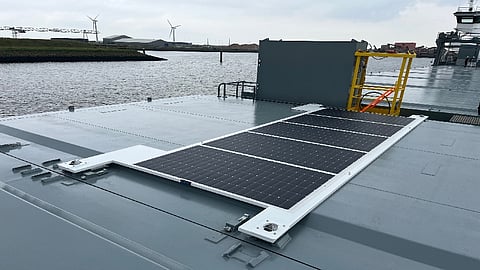

Key Takeaways:
Wattlab’s SolarDeck system can be installed in under 8 hours and removed or stored in a standard container when not in use, preserving valuable deck space
A successful EU-backed pilot with Vertom and TNO demonstrated durability through storms and resilience against harsh cleaning procedures, with consistent power output
The pilot predicts 30 MT of fuel savings and 96 MT of CO2 reduction annually, showcasing real potential for solar integration in maritime shipping
The transportation industry contributes more than 20% of the global carbon dioxide (CO2) emissions. As per the IEA’s 2022 data, maritime shipping contributed about 3% of the global total. Although there are alternatives to fossil fuels, such as biofuels, hydrogen, ammonia, methanol, and electricity, their share of fuel consumption is insignificant. Using solar PV solutions to generate electricity can reduce the consumption of fossil fuels and CO2 emissions in maritime shipping.
Netherlands-based Wattlab offers SolarDeck, a modular and scalable deck-mounted solar system that can be installed on seagoing ships. Established in 2017, Wattlab initially focused on inland shipping with its Solar Flatrack product, a movable and stackable modular system integrated with solar panels and inverters. Wattlab claims that the new SolarDeck modular system is designed to operate in a plug-and-play fashion and can be installed within 8 hours by a minimum crew, and can be stored inside the volume of a 20-foot container when not required.
“At all times during the design of SolarDeck, we prioritised the shipowner’s requirements. We know that ‘time is money’. That’s why the SolarDeck can be installed in a minimum amount of time using container twist lock fittings. It also does not impact normal loading and unloading procedures. However, we also know – for cargo shipowners especially – that ‘space is money’. In the event of a deck load such as offshore wind blades, the ship’s crew can store the SolarDeck inside the volume of a 20-foot container, thus freeing up the deck for cargo,” says Wattlab CEO Bo Salet.
The company also states that the SolarDeck is built in a way that any accidental cable damage or breakage leads the system to shut down automatically, with no current flow through the broken cables.
To further promote its product, Wattlab ran a pilot project in collaboration with 2 partners, namely, the Dutch Organization for Applied Scientific Research (TNO) and the international shipping company Vertom. This pilot was co-funded by the European Union. SolarDeck was installed on Vertom’s dry cargo vessel Anette. Wattlab used TNO’s support in monitoring the power output and fuel reduction calculations, whereas Vertom provided support in validating the physical and mechanical characteristics of SolarDeck.
The company proudly states that the results were quite positive, with some design aspects that require fine-tuning, but without any red flags. During the course of the pilot, the cargo vessel had to sail through storms, but the company highlights that the system performed well, thanks to its water drainage design and structural durability, with no significant changes in power output.
Salet says, “We specifically asked the Anette’s crew to carry on their usual deck cleaning activities. This involved rinsing with fresh water, cleaning with normal soap, and also with their toughest cleaning material: heavy duty acidic descaling liquid. The SolarDeck continued working at all times”.
With these positive results, the company now aims to launch its next product, which covers larger or full-area ship decks with solar panels and expects to deliver such a system by the summer of 2025. The system is said to address challenges involved during loading and unloading by unplugging the cables and stacking the panel using twist lock systems, in a volume equivalent to a 20-foot container.
Based on the results from the pilot project, the company predicts an annual reduction of up to 30 MT of fuel consumption and a corresponding 96 MT reduction in CO2 emissions for a single cargo ship.
